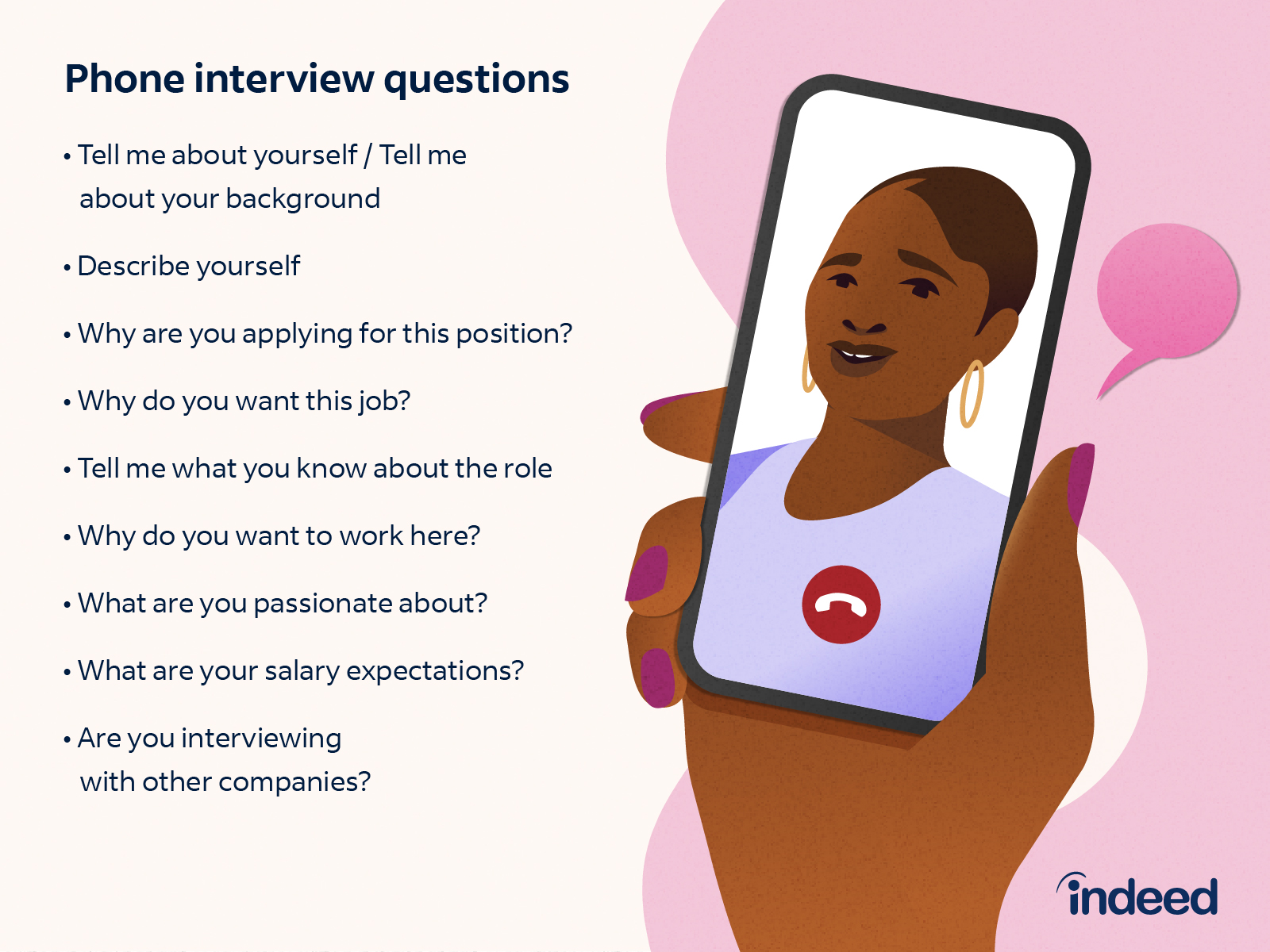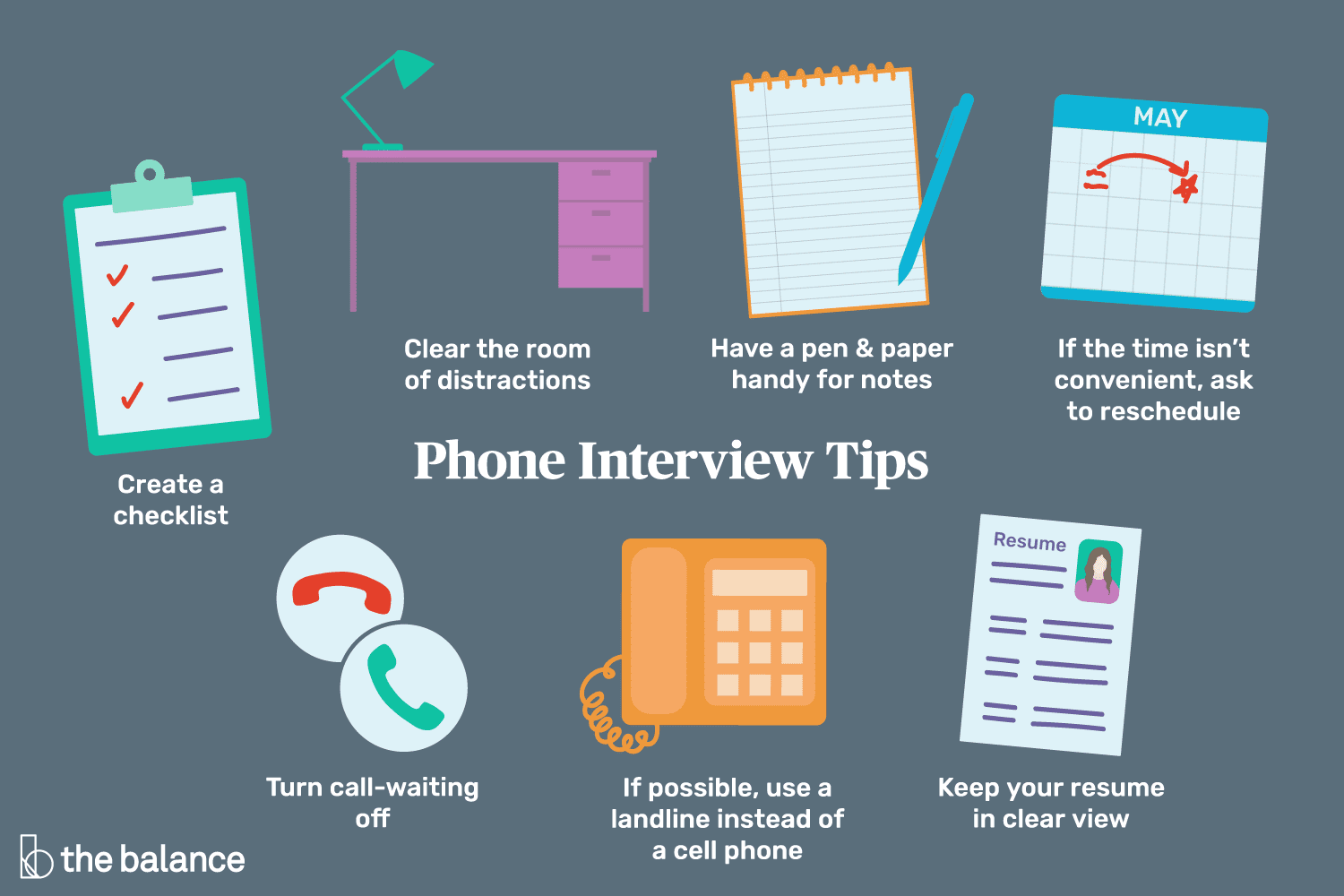To prepare for a phone interview, research the company and practice your responses to common interview questions. Ensure a quiet environment and have your resume handy.
Phone interviews are crucial for making a strong first impression. They often serve as the initial screening process for employers. Adequate preparation can significantly boost your chances of advancing to the next stage. Researching the company helps you understand its culture and values.
Practicing common interview questions allows you to articulate your thoughts clearly. Choosing a quiet environment ensures no distractions, making the conversation smoother. Keeping your resume nearby helps you reference your experience accurately. By focusing on these aspects, you can approach your phone interview with confidence and professionalism.
Introduction To Phone Interviews
Phone interviews are an important part of the hiring process. They are often the first step in getting to know a candidate. Preparing well for a phone interview can make a big difference. You can create a strong first impression with good preparation.
The Rise Of Remote Hiring
Remote hiring is becoming more common. Many companies prefer phone interviews to screen candidates. This method saves time and resources for both parties.
With remote hiring, location is no longer a barrier. Companies can now interview candidates from anywhere in the world. This opens up many opportunities for job seekers.
What To Expect In A Phone Interview
In a phone interview, you will usually talk to a recruiter or hiring manager. The call may last around 30 minutes. They will ask about your background and skills.
Expect questions about your experience. Be ready to discuss your past jobs and achievements. They may also ask why you want to join their company.
Here are some common topics covered in phone interviews:
- Your resume and work history
- Your skills and qualifications
- Your career goals
- The role and company
Be prepared to ask questions too. This shows your interest in the role. It also helps you understand if the job is a good fit for you.

Credit: www.indeed.com
Setting The Stage
The phone interview is often the first step in the hiring process. Setting the stage properly can make a significant difference. Follow these tips to ensure you’re fully prepared and confident.
Choosing A Quiet Location
Find a quiet location where you won’t be interrupted. This could be a home office or a quiet room.
Make sure there are no background noises like TV, pets, or family members. You want to hear the interviewer clearly and they should hear you well too.
If you live with others, let them know about your interview time. This way, they won’t disturb you during the call.
Ensuring A Good Connection
A stable phone connection is crucial. A bad connection can ruin the interview.
Test your phone connection before the interview. Make a call to a friend to ensure it’s clear and stable.
Have a backup plan in case of issues. Keep a landline or another mobile phone nearby.
| Task | Importance |
|---|---|
| Choose a quiet location | High |
| Test phone connection | High |
| Inform housemates | Medium |
Researching The Company
Preparing for a phone interview involves many steps. One key step is researching the company. Knowing the company well shows your interest and dedication. It also helps you tailor your answers to align with the company’s values and goals.
Reviewing The Job Description
Start by reviewing the job description. This document outlines the skills and qualifications needed. Make a list of these requirements. Compare them with your own skills and experiences.
- Highlight key responsibilities.
- Note any specific skills mentioned.
- Identify the main goals of the role.
Having this information at hand will help you answer questions accurately. It shows you understand what the job entails.
Understanding The Company Culture
Understanding the company culture is crucial. Visit their website and social media pages. Look for sections like “About Us” or “Our Team”. These sections often describe the company’s values and work environment.
- Read employee testimonials.
- Check out recent company news.
- Look at their social media posts.
This research helps you understand how the company treats its employees. It also gives you insights into the type of workplace you might join.
| Research Task | Purpose |
|---|---|
| Review Job Description | Understand the role requirements |
| Check Company Website | Learn about company values |
| Read Employee Testimonials | Gain insights into the work environment |
Thorough research helps you feel confident during the interview. It shows that you are well-prepared and serious about the opportunity.
Crafting Your Elevator Pitch
Preparing for a phone interview can be nerve-wracking. One effective strategy is to craft a compelling elevator pitch. This pitch helps you make a strong first impression. It should be concise yet powerful.
Highlighting Your Experience
Your elevator pitch should start with a brief introduction. Mention your name and your current position. Then, highlight your relevant experience.
For example, you could say:
“Hi, my name is Jane Doe. I am currently a marketing manager at XYZ Corp. I have over five years of experience in digital marketing.”
Make sure to focus on the most relevant aspects of your experience. This will grab the interviewer’s attention.
Connecting Skills To Job Requirements
Next, connect your skills to the job requirements. Read the job description carefully. Identify the key skills needed for the role.
Create a list:
- Leadership
- Project Management
- Data Analysis
- Communication
Then, explain how your skills match these requirements. For example:
“In my current role, I have led several successful marketing campaigns. I have managed projects from start to finish, ensuring they meet our goals. My ability to analyze data has helped optimize our strategies. Communication is key in my role, and I excel at it.”
By doing this, you show the interviewer that you are a perfect fit for the job.
Here is a table summarizing the steps:
| Step | Description |
|---|---|
| Introduction | Mention your name and current position. |
| Highlight Experience | Focus on relevant experience. |
| Connect Skills | Match your skills to job requirements. |
Common Phone Interview Questions
Phone interviews are a crucial step in the hiring process. Preparation is key to success. Knowing the common questions asked can help you feel more confident. This section will guide you on how to prepare for these questions.
Preparing Your Responses
Preparing your responses can set you apart from other candidates. Start by researching the company and the role. This helps tailor your answers to the job.
- Tell me about yourself: Keep it brief and relevant to the job.
- Why do you want this job? Align your answer with the company’s mission.
- What are your strengths and weaknesses? Be honest but focus on strengths that match the job.
- Where do you see yourself in 5 years? Show ambition but also align with the company’s goals.
Practice your answers out loud. This helps you sound natural and confident during the interview.
Answering Behavioral Questions
Behavioral questions assess how you handled past situations. Employers use these to predict future behavior. The STAR method (Situation, Task, Action, Result) is an effective way to structure your answers.
| Question | Example Response |
|---|---|
| Describe a time you faced a challenge at work. | Situation: I had a tight deadline on a project. Task: I needed to deliver a high-quality report. Action: I prioritized tasks and worked overtime. Result: The project was completed on time and praised for its quality. |
| Give an example of a goal you reached and how you achieved it. | Situation: I aimed to improve my sales numbers. Task: I set a target of increasing sales by 20%. Action: I focused on building client relationships. Result: My sales increased by 25% in three months. |
Practice these responses to make them sound natural. Remember to keep your answers concise and focused.

Credit: www.indeed.com
The Art Of Listening
The art of listening is crucial during a phone interview. Listening attentively shows respect and helps you understand the interviewer’s needs. It can also help you respond more thoughtfully. Below are some key aspects to master the art of listening during a phone interview.
Avoiding Interruptions
Interruptions can break the flow of conversation. They may also make you appear impatient. Here are some tips to avoid interruptions:
- Find a quiet place for the interview.
- Inform family or roommates about your interview time.
- Turn off notifications on your phone and computer.
Showing Engagement
Engaging with the interviewer shows that you are interested. It also helps build rapport. Here are some ways to show engagement:
- Use verbal nods like “I see,” “Yes,” or “Interesting.”
- Repeat key points to show you are listening.
- Ask follow-up questions based on what the interviewer says.
Remember, your tone of voice matters. Keep it positive and enthusiastic.
Closing The Conversation
Ending your phone interview on a strong note is crucial. This is your chance to leave a lasting impression. You must ensure the interviewer knows you are enthusiastic, prepared, and professional.
Expressing Enthusiasm For The Role
Before the call ends, show your excitement about the position. Use phrases like, “I am very excited about this opportunity.” This demonstrates your genuine interest.
Highlight a few key points from the conversation. Say something like, “Our discussion about the company’s values resonates with me.” This shows you were attentive and engaged.
Inquiring About Next Steps
It’s important to understand what happens next. Ask questions like, “What are the next steps in the interview process?“
Clarify the timeline. You could ask, “When should I expect to hear back?” This helps you manage your expectations and stay informed.
| Question | Purpose |
|---|---|
| What are the next steps in the interview process? | To know the interview timeline |
| When should I expect to hear back? | To understand the response time |
By asking these questions, you show you are proactive and interested in moving forward. This leaves a positive impression with the interviewer.
:max_bytes(150000):strip_icc()/how-to-prepare-for-a-job-interview-2061361_final-5b88000a46e0fb0050fab985.png)
Credit: www.thebalancemoney.com
Post-interview Protocol
Congratulations on completing your phone interview! This is a crucial step in the job search process. But your efforts should not stop here. The post-interview protocol is vital to leave a lasting impression and reflect on your performance. Below are essential steps to follow after your phone interview.
Sending A Thank-you Email
Sending a thank-you email is a must. It shows appreciation and reinforces your interest in the position. Aim to send this email within 24 hours of your interview.
Here is a simple structure for your thank-you email:
| Section | Details |
|---|---|
| Subject Line | Thank You – [Your Name] |
| Greeting | Dear [Interviewer’s Name], |
| Body |
|
| Closing | Best regards, [Your Name] |
Reflecting On The Interview Experience
Reflecting on your interview experience helps you learn and improve. Immediately after the interview, jot down your thoughts. This will help you remember key points and areas for improvement.
Here are some questions to guide your reflection:
- What questions did the interviewer ask?
- How well did you answer those questions?
- What could you have done better?
- Were there any questions you struggled with?
- How did you feel about the interview overall?
Reflecting helps you understand your strengths and identify areas for improvement. This will make you more prepared for future interviews.
Following Up
Following up after a phone interview is crucial for job seekers. It shows your interest and professionalism. The follow-up can make a significant difference in a competitive job market. Below are some tips to help you follow up effectively.
Timing Your Follow-up
Timing is key for your follow-up message. Send a thank-you email within 24 hours of your interview. This keeps you fresh in the interviewer’s mind.
If you don’t hear back in a week, send a polite follow-up email. Avoid multiple follow-ups in a short time. This can appear pushy.
Maintaining Professionalism
Maintain a professional tone in your follow-up emails. Address the interviewer by their title and last name. Use proper grammar and spelling.
In your email, thank the interviewer for their time. Mention something specific discussed during the interview. This shows your attention to detail.
Here is a sample follow-up email:
Dear Mr. Smith,
Thank you for the opportunity to discuss the [Job Title] position at [Company Name]. I enjoyed learning more about the role and the team.
I am very excited about the opportunity to contribute to [Specific Project or Company Goal]. Please let me know if you need any additional information.
Thank you again for your time and consideration.
Best regards,
[Your Name]
Proofread your email before sending it. Errors can undermine your professionalism. Keep it concise and to the point.
Handling Rejection
Facing rejection after a phone interview can be tough. It’s easy to feel disheartened, but understanding how to handle rejection is crucial. This part of the job search process can actually be an opportunity for growth and self-improvement.
Learning From Feedback
Always ask for feedback after a rejection. This will help you understand areas where you can improve. Make a list of the feedback points. Look for common themes or repeated suggestions. Use this information to refine your skills and interview techniques. For example:
- If they mention you need more experience, consider taking online courses or workshops.
- If they say you lacked confidence, practice your responses with a friend or mentor.
- If they note specific skill gaps, focus on gaining those skills.
Feedback is a valuable tool. It’s like a roadmap to becoming a stronger candidate.
Staying Motivated In Your Job Search
Rejection can hit hard, but staying motivated is key. Set small, achievable goals each week. For instance:
- Apply to five new jobs.
- Update your resume.
- Practice answering common interview questions.
Celebrate your achievements, no matter how small. This helps maintain a positive attitude. Surround yourself with supportive friends and family. Their encouragement can keep you going. Also, remember to take breaks. Job searching can be exhausting. A short break can refresh your mind and energy.
Lastly, keep a journal of your job search activities. Note down what worked well and what didn’t. This helps track your progress and stay focused on your goals.
Example Table Of Feedback
| Feedback Point | Action to Take |
|---|---|
| Need more experience | Take online courses |
| Lacked confidence | Practice responses with a friend |
| Specific skill gaps | Focus on gaining those skills |
Frequently Asked Questions
How To Ace A Phone Interview?
Prepare thoroughly, research the company, and practice common questions. Speak clearly and confidently. Listen actively and respond promptly. Follow up with a thank-you email.
What Questions Are Asked In A Telephone Interview?
Common questions include discussing your resume, experience, skills, career goals, and why you want the job. They may also ask about availability, salary expectations, and how you handle challenges.
What Should I Say At The Beginning Of A Phone Interview?
Start with a friendly greeting and introduce yourself. Mention the job you’re applying for and express enthusiasm.
How Do I Prepare For A 30 Minute Phone Interview?
Research the company and role. Practice common interview questions. Prepare questions to ask the interviewer. Ensure a quiet, distraction-free environment. Have your resume and notes handy.
Conclusion
Preparing for a phone interview requires careful planning and practice. Follow these tips to boost your confidence. Remember to stay calm and focused during the call. Success in a phone interview is achievable with the right preparation. Good luck with your upcoming interview!



